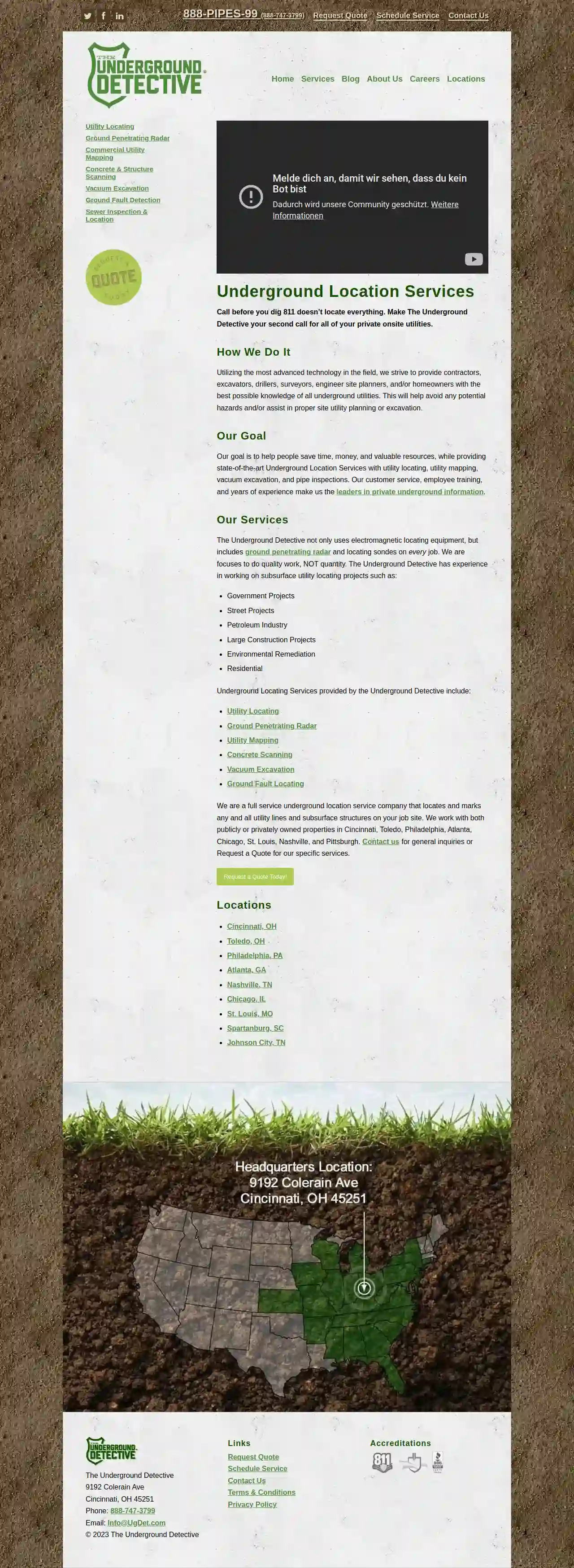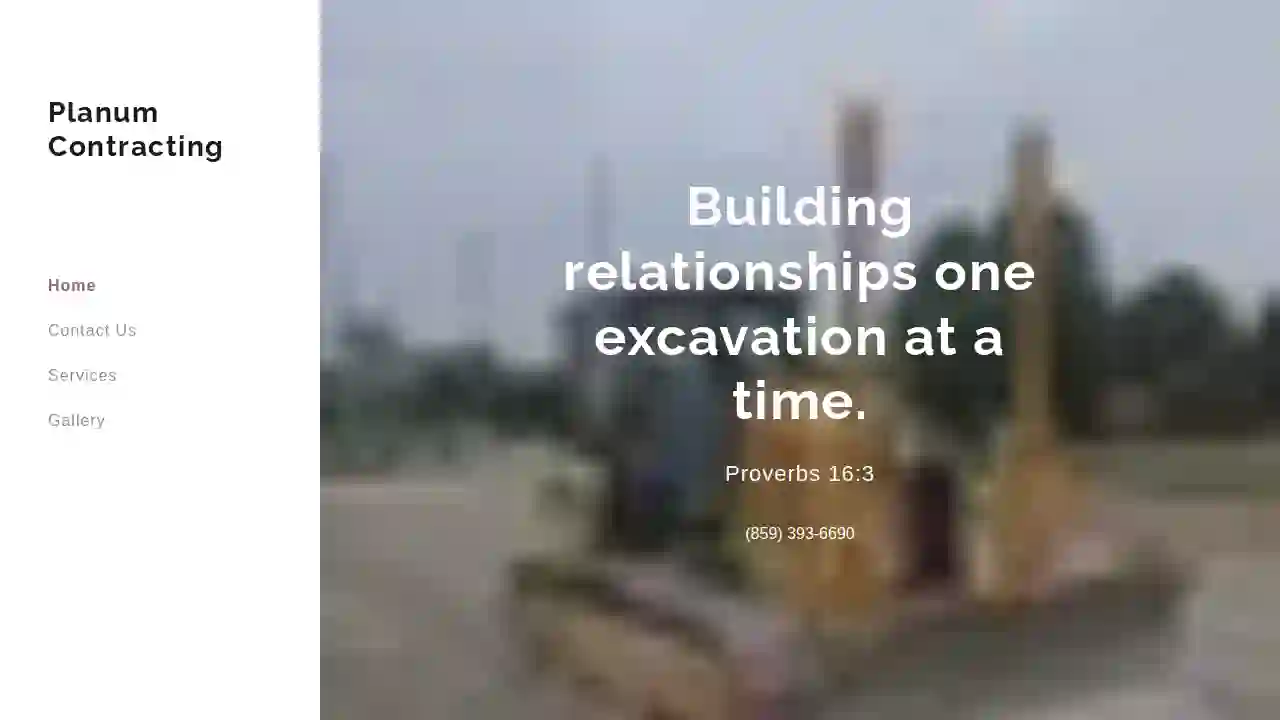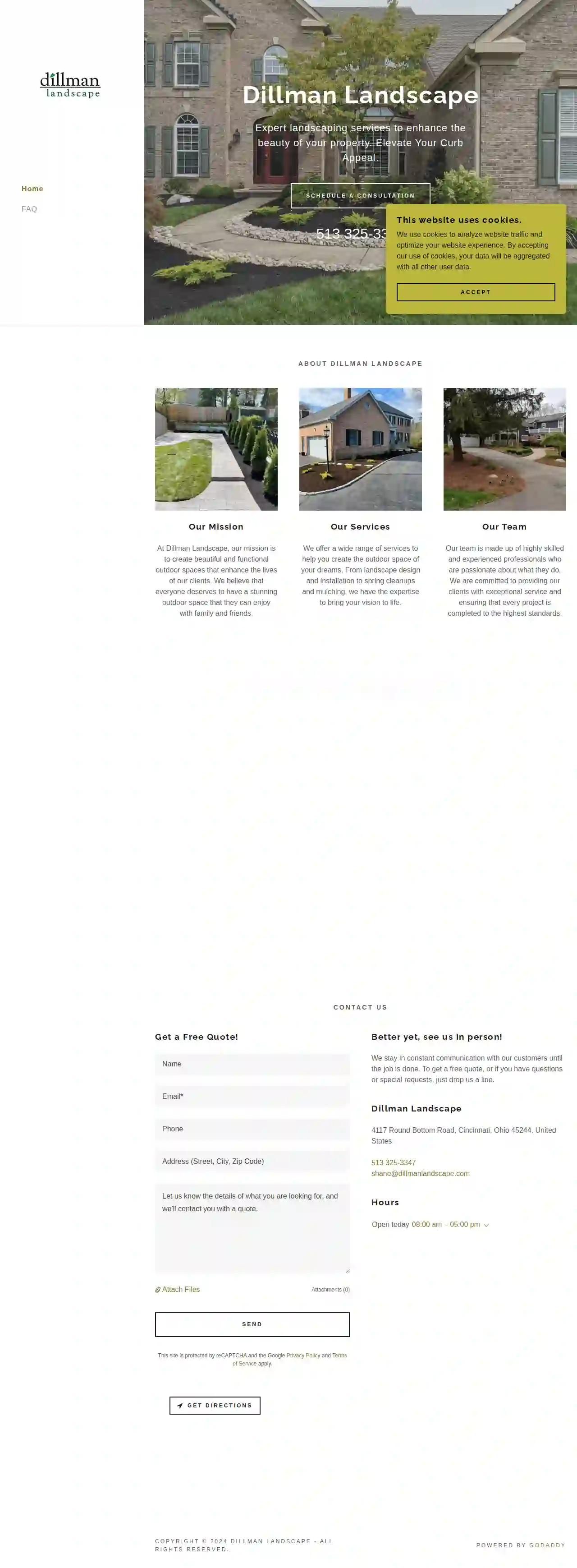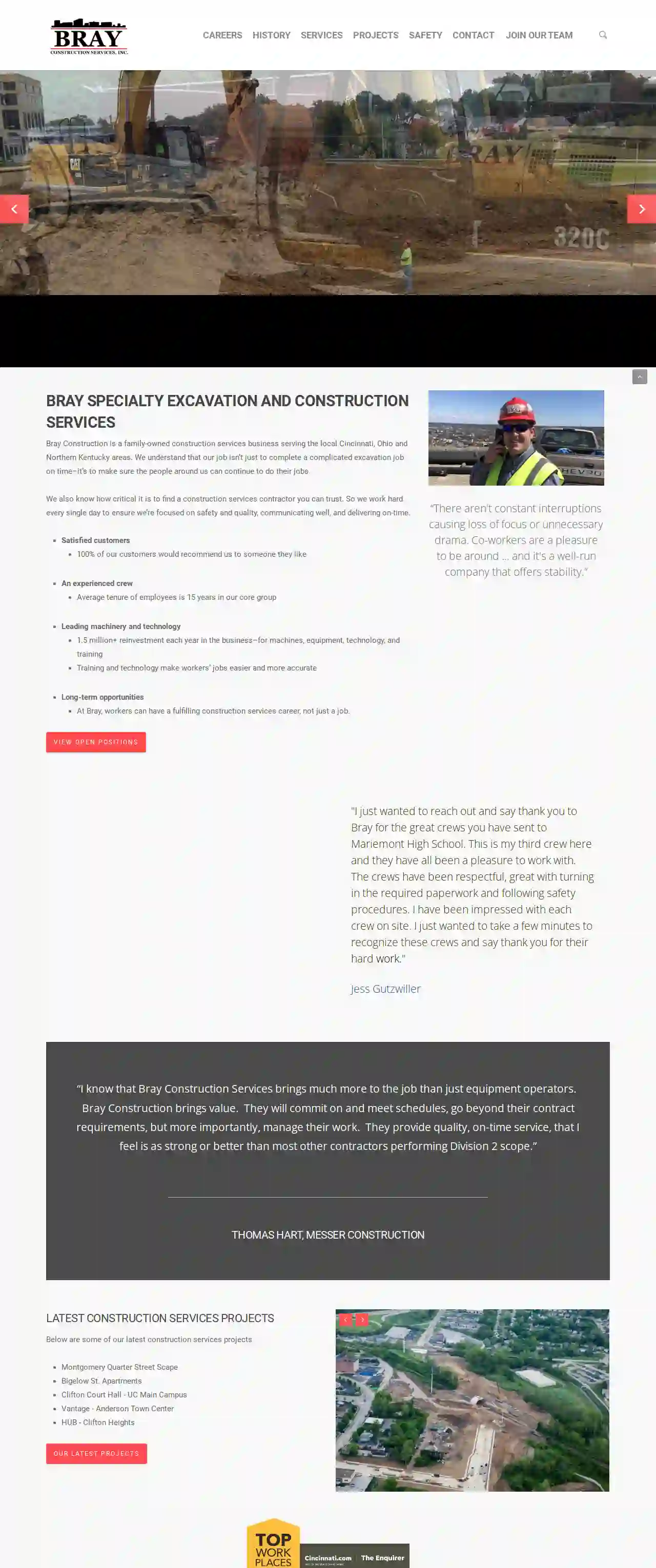Dirt Contractors Cincinnati
Top Dirt Removal in Cincinnati
Get up to 3 Dirt Contractors quotes for your project today! Compare profiles, reviews, accreditations, portfolio, etc... and choose the best offer.

Underground Detective Cincinnati
4.620 reviews9192 Colerain Avenue, Cincinnati, 45251, USCommitted to excellence! The Underground Detective has grown and evolved to provide invaluable services to a wide variety of clients. As years progress and demand continues to change, our commitment to being a family remains strong. We value your time and your trust. We treat our name and your confidence #1 in everything we do and ALWAYS give you all the knowledge we can to save you time, money, and resources. Originally plumbers, the owner of The Underground Detective and his head technician often struggled to find the proper place to excavate when a sewer problem occurred. In 1975, they purchased a piece of equipment to locate underground utilities on their own. Other plumbers in the area began to use their new service, but it wasn’t until 1992 that The Underground Detective of Greater Cincinnati, LLC officially became a company. Since then, the company has grown and expanded to specialize in the location of many underground utilities. Our Mission We strive to provide contractors, excavators, surveyors, engineer site planners, and/or homeowners with the best possible knowledge of all underground utilities. This will help avoid any potential hazards and/or assist in proper site utility planning or excavation. Our goal is to help people save time, money, and valuable resources, while providing state-of-the-art utility locating, utility mapping, vacuum excavation, pipe inspections, and leak locating solutions. Our service and accuracy are unparalleled.
- Services
- Why Us?
- Gallery
Get Quote- Em
Empire Excavation
53 reviewsCincinnati, USAbout Empire Excavation LLC Empire Excavation LLC is a locally owned and operated excavation company serving the [CITY] area. We are committed to providing our clients with high-quality excavation services at competitive prices. Our team of experienced professionals is dedicated to delivering exceptional results on every project, no matter how big or small. We specialize in a wide range of excavation services, including: Site preparation Foundation excavation Utility installation Demolition Grading And more! We are fully licensed and insured, and we are committed to safety on every job site. We use only the latest equipment and technology to ensure that our projects are completed on time and within budget. Contact us today for a free estimate!
- Services
- Why Us?
- Gallery
Get Quote 
Planum Contracting
523 reviews6342 Markham Court, Independence, 41051, USBuilding relationships one excavation at a time. Proverbs 16:3 About Us At Planum Contracting we specialize in a variety of excavation services and concrete services. Services include (but not limited to) fine grading, lazer dozers, GPS dozers, digging footers, land clearing, site work, and concrete services. Call us today and lets talk about how we can assist you in your project. Working Together One of the owners here at Planum was a former division 1 football player. The only way to get the job done properly and correct is to work as a team. Here at Planum we will work as team to get your job done on time and on budget. Why Choose Us? We work with architects and designers to produce beautiful, functional structures. Call us today and bring our project management skills and extensive construction experience to your next project.
- Services
- Why Us?
Get Quote
Delta Construction & Concrete
1Cincinnati, US- Services
- Why Us?
Get Quote
Crete-Busters Concrete Demo
3.54 reviews1001 N 13th St, Crete, 68333, USAbout Crete Busters Crete Busters is a family-owned and operated business serving the Crete, Nebraska area since 2003. We are dedicated to providing our customers with the highest quality septic services at competitive prices. Our team of experienced technicians is committed to providing prompt, professional, and reliable service. We are fully licensed and insured, and we offer a wide range of services to meet your needs. We understand that septic system issues can be stressful and inconvenient. That's why we strive to make the process as easy and hassle-free as possible. We offer free estimates and 24/7 emergency service. We are also committed to providing our customers with the information they need to make informed decisions about their septic systems. We are proud to be a part of the Crete community and we are committed to providing our customers with the best possible service. Contact us today for a free estimate or to schedule an appointment.
- Services
- Why Us?
- Testimonials
Get Quote
In Your Zone Construction LLC
1Cincinnati, US- Services
- Why Us?
Get Quote
Dillman Landscape
4.819 reviewsCincinnati, US- Services
- Why Us?
Get Quote
Bray Construction Services Inc.
3.911 reviewsCincinnati, US- Services
- Why Us?
Get Quote
Tree Images - Professional Tree Service
4.731 reviewsCincinnati, US- Services
- Why Us?
Get Quote
Auxier Trucking & Excavating Co.
4.665 reviewsCincinnati, US- Services
- Why Us?
Get Quote
Over 3,943+ Excavation Companies on our directory
Our excavation providers operate in Cincinnati and surroundings!
ExcavationHQ has curated and vetted Top Excavation Pros near Cincinnati. Find the most trustworthy contractor today.
Frequently Asked Questions About Dirt Contractors
- For Structural Fill: Use compacted granular fill, such as gravel or crushed stone, for stability and drainage. Avoid using organic materials like topsoil or wood chips, as they decompose and can create voids over time.
- For Landscaping: If you plan to plant in the filled area, use a blend of topsoil and fill dirt. This provides a balance of fertility and structure. Amend the soil with compost or other organic matter to enhance its drainage and nutrient content.
- For Drainage: If the hole is intended for drainage, use a layer of gravel or crushed stone at the bottom to improve water flow. Then, backfill with a porous soil mix that allows water to percolate through.
- Erosion Control: Implement measures to prevent soil erosion during and after excavation, grading, or dirt removal. This includes using silt fences, erosion control blankets, or planting vegetation to stabilize the soil.
- Soil Conservation: Preserve existing topsoil whenever possible, as it's a valuable resource for plant growth. Strip and stockpile topsoil separately for reuse in landscaping or gardening.
- Responsible Waste Management: Dispose of excess dirt, debris, and contaminated soil responsibly at designated facilities. Recycle materials whenever possible to reduce waste sent to landfills.
- Dust Control: Minimize dust generation during excavation and hauling by using water sprays, misting systems, or other dust suppression techniques.
- Noise Reduction: Use noise-reducing equipment and schedule noisy activities during permitted hours to minimize disturbance to neighbors and wildlife.
- Excavators: Versatile machines with a digging arm and bucket, used for excavation, trenching, loading trucks, and demolition.
- Bulldozers: Heavy machines with a large blade at the front, used for pushing and moving dirt, clearing land, and grading.
- Skid Steers: Compact, versatile machines with various attachments, including buckets, forks, and augers, used for digging, loading, grading, and more.
- Dump Trucks: Heavy-duty trucks designed for hauling dirt, gravel, and other bulk materials. Sizes vary based on carrying capacity.
- Graders: Machines with a long blade used for precise leveling and shaping of land surfaces, often used for road construction and site preparation.
- Compactors: Equipment used to compress soil, including plate compactors, rollers, and vibratory tampers, essential for achieving soil stability.
What type of dirt is best for filling a hole?
What are the environmental considerations for dirt contracting?
How much dirt do I need for my project?
1. **Measure the area:** Determine the length, width, and depth (in feet) of the area where you need dirt.
2. **Calculate the volume:** Multiply the length x width x depth to get the volume in cubic feet.
3. **Convert to cubic yards:** Divide the cubic feet volume by 27 (there are 27 cubic feet in one cubic yard).
**Example:**
If your area is 10 feet long x 5 feet wide x 2 feet deep, the volume would be: 10 x 5 x 2 = 100 cubic feet
To convert to cubic yards: 100 / 27 = 3.7 cubic yards (round up to 4 cubic yards to ensure you have enough).
It's advisable to consult with a dirt contractor or landscaper for more accurate calculations, especially for complex projects or irregular-shaped areas.
What are some common dirt contracting equipment?
What type of dirt is best for filling a hole?
- For Structural Fill: Use compacted granular fill, such as gravel or crushed stone, for stability and drainage. Avoid using organic materials like topsoil or wood chips, as they decompose and can create voids over time.
- For Landscaping: If you plan to plant in the filled area, use a blend of topsoil and fill dirt. This provides a balance of fertility and structure. Amend the soil with compost or other organic matter to enhance its drainage and nutrient content.
- For Drainage: If the hole is intended for drainage, use a layer of gravel or crushed stone at the bottom to improve water flow. Then, backfill with a porous soil mix that allows water to percolate through.
What are the environmental considerations for dirt contracting?
- Erosion Control: Implement measures to prevent soil erosion during and after excavation, grading, or dirt removal. This includes using silt fences, erosion control blankets, or planting vegetation to stabilize the soil.
- Soil Conservation: Preserve existing topsoil whenever possible, as it's a valuable resource for plant growth. Strip and stockpile topsoil separately for reuse in landscaping or gardening.
- Responsible Waste Management: Dispose of excess dirt, debris, and contaminated soil responsibly at designated facilities. Recycle materials whenever possible to reduce waste sent to landfills.
- Dust Control: Minimize dust generation during excavation and hauling by using water sprays, misting systems, or other dust suppression techniques.
- Noise Reduction: Use noise-reducing equipment and schedule noisy activities during permitted hours to minimize disturbance to neighbors and wildlife.
How much dirt do I need for my project?
1. **Measure the area:** Determine the length, width, and depth (in feet) of the area where you need dirt.
2. **Calculate the volume:** Multiply the length x width x depth to get the volume in cubic feet.
3. **Convert to cubic yards:** Divide the cubic feet volume by 27 (there are 27 cubic feet in one cubic yard).
**Example:**
If your area is 10 feet long x 5 feet wide x 2 feet deep, the volume would be: 10 x 5 x 2 = 100 cubic feet
To convert to cubic yards: 100 / 27 = 3.7 cubic yards (round up to 4 cubic yards to ensure you have enough).
It's advisable to consult with a dirt contractor or landscaper for more accurate calculations, especially for complex projects or irregular-shaped areas.
What are some common dirt contracting equipment?
- Excavators: Versatile machines with a digging arm and bucket, used for excavation, trenching, loading trucks, and demolition.
- Bulldozers: Heavy machines with a large blade at the front, used for pushing and moving dirt, clearing land, and grading.
- Skid Steers: Compact, versatile machines with various attachments, including buckets, forks, and augers, used for digging, loading, grading, and more.
- Dump Trucks: Heavy-duty trucks designed for hauling dirt, gravel, and other bulk materials. Sizes vary based on carrying capacity.
- Graders: Machines with a long blade used for precise leveling and shaping of land surfaces, often used for road construction and site preparation.
- Compactors: Equipment used to compress soil, including plate compactors, rollers, and vibratory tampers, essential for achieving soil stability.